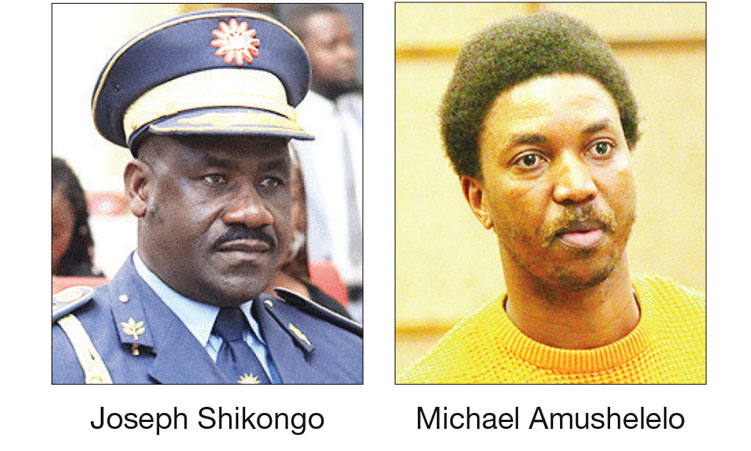POLICE inspector general Joseph Shikongo has rubbished claims that the continuous detention of social activist Michael Amushelelo is due to the police.
Shikongo says Amushelelo’ detention is due to the fact that the case is before the court.
He made these comments during a training workshop held in Windhoek on Monday on freedom of expression and journalism for police officers.
“People are saying that we are denying Amushelelo bail because of a protest on 21 March. That is not the case. Amushelelo’s continued detention is not based on the police, it is on the basis that it is before the court,” Shikongo said.
He said others arrested on the same day, such as Dimbulukeni Nauyoma and parliamentarian Inna Hengari, were given bail. The case against Hengari has since been withdrawn.
“I think people should not mix up things. We have seen Amushelelo speaking louder after my accident, but I think his continued detention has nothing to do with my accident,” Shikongo said.
Phone calls and a text message sent to Amushelelo’s lawyer, Kadhila Amoomo, went unanswered yesterday.
In February, Shikongo, represented by lawyer Nambili Mhata, issued a N$1 million legal threat to Amushelelo, demanding that he halt the dissemination of false social media rumours.
The demand emphasised that Amushelelo’s online remarks not only contained untruths, but also malicious insinuation about Shikongo’s character, suggesting involvement in tampering with disaster scene investigations and portraying him as someone willing to break the law without regard for the consequences.
Amushelelo also alleged that Shikongo was unfit for the role of inspector general of the Namibian Police, an accusation that the demand letter firmly rejected.
The demand refuted claims of Shikongo having issued orders to kill Amusheleo.
This controversy stemmed from an accident involving Shikongo in December last year, resulting in the loss of three lives.
Amushelelo has been in custody since March, after he was arrested alongside social activist Nauyoma and the Popular Democratic Movement’s Hengari.
Their arrests stemmed from their involvement in organising a nationwide protest against youth unemployment on Independence Day.
They faced charges including public violence, incitement to public violence and malicious damage to property.
While Hengari and Nauyoma were granted bail of N$5 000 each, Amushelelo’s bail appeal was rejected in the Windhoek High Court last month.
He now plans to appeal to the Supreme Court.
Since Amushelelo’s arrest and detention, supporters and leaders of the Namibia Economic Freedom Fighters described his arrest and refusal of bail as politically motivated.
Political analyst Marius Kudumo says the perception that Amushelelo’s detention is politically motivated cannot be disputed.
“There is that perception that there is also an issue of fair trial in this country as a constitutional imperative. Meaning that if people have committed an offence, they are supposed to be charged and their case is heard speedily so that their guilt or innocence is actually proven,” Kudumo says.
If one does not deal with a matter speedily and there are delays and postponements, and the public does not see any reason why the issue is being postponed, they will then arrive at such a perception, he says.
“They will think the matter is politically motivated. And, therefore, you cannot dispute that perception. You must communicate and provide reason why the detention is prolonged,” he says.
Kudumo added that an individual has a right to a fair and speedy trial in order to be found guilty or not, as stipulated in the Constitution.
“Whoever is accused of anything, they need to appear before a court that is supposed to be independent from the legislature to the executive, so that their case is heard,” he said.
“Otherwise, you will promote these perceptions. Those who say these are perceptions must also prove otherwise,” Kudomo said.



Leave a Reply